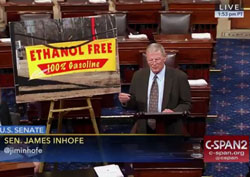 The U.S. ethanol industry is encouraged by a 30 day delay by the Executive Management Committee of CAMEX, Brazil’s Chamber of Foreign Trade in making a decision on a proposed 20 percent tariff on U.S. ethanol imports.
The U.S. ethanol industry is encouraged by a 30 day delay by the Executive Management Committee of CAMEX, Brazil’s Chamber of Foreign Trade in making a decision on a proposed 20 percent tariff on U.S. ethanol imports.
U.S. Grains Council (USGC) President and CEO Tom Sleight, Renewable Fuels Association (RFA) President and CEO Bob Dinneen and Growth Energy CEO Emily Skor issued a joint statement on the delay, stressing the impact such an action would have.
“This decision should not be taken lightly, as imposing tariffs on U.S. ethanol imports will hurt Brazilian consumers by driving up their costs at the pump. Additionally, this action on U.S. ethanol imports will go against Brazil’s own longstanding view that ethanol tariffs are inappropriate and will harm the development of the global ethanol industry,” said the organization leaders. “We will continue to work towards educating Brazilian policymakers on how misguided this tariff would be, which would harm consumers by denying them access to the lowest cost, cleanest and highest octane source of fuel in the world. This proposal, if implemented, would have wide-ranging and long-standing impacts on both our industries and the global fuel supply.”
The proposal would allow 500 million liters annually of U.S. ethanol imports (132.1 million gallons) before triggering the tariff.










